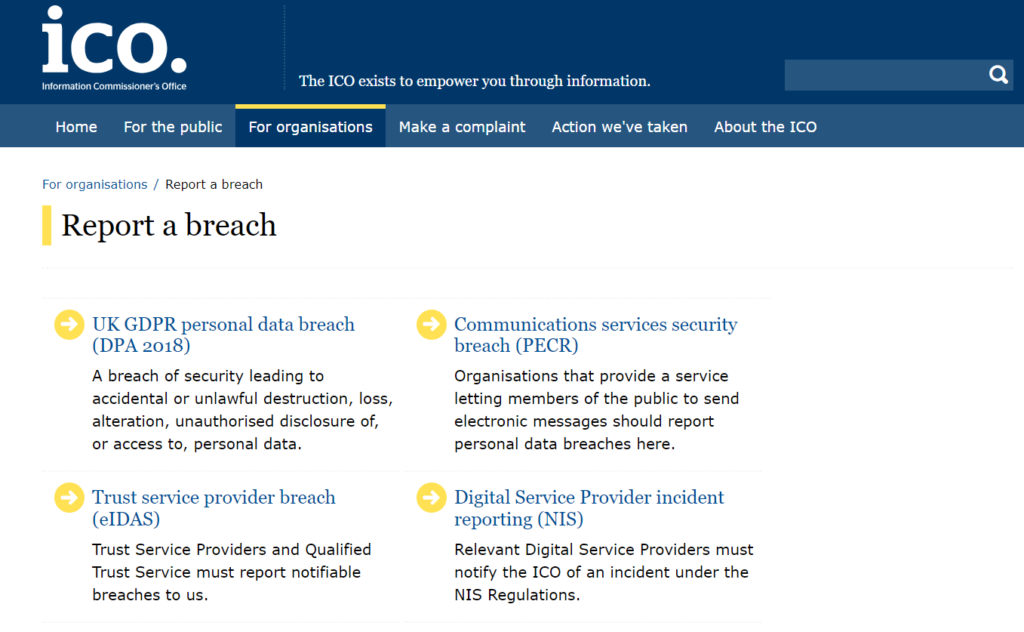When it comes to data breaches, the saying “time is of the essence” takes on a critical significance. The speed at which a company reports a breach can significantly impact the severity of its consequences for both the organisation and the affected individuals.
Under the GDPR, the initial 72 hours after discovering a data breach are critical. Article 33 mandates that data controllers must report certain types of personal data breaches to the appropriate supervisory authority, in the UK’s case, the Information Commissioner’s Office (ICO), without undue delay and, if at all possible, within 72 hours after becoming aware of it.

Not all data breaches necessitate reporting. They need to be reported only if they pose a risk to the rights and freedoms of individuals, which typically refers to the potential for economic or social harm, reputational damage, or financial losses. However, the GDPR also requires that all breaches, reportable or not, be recorded internally.
It’s important to note, that the focus should be on demonstrating progress in addressing the breach rather than strictly adhering to the 72-hour timeframe. A well-documented response, even if slightly delayed, is preferable to a rushed, incomplete report.
Steps Post-Detection a Data Breach
The immediate response to a breach should include:
- Assessing the scope and impact of the breach.
- Containing the breach to prevent further unauthorised access.
- Gathering all relevant information about the breach.
- Notifying the appropriate regulatory body within the required timeframe.
- Communicating with affected individuals, especially if there is a high risk to their rights and freedoms.
Prompt reporting of a data breach can help mitigate the damage. It allows affected individuals to take protective measures against identity theft or fraud. For companies, it demonstrates a commitment to transparency and regulatory compliance, which can help preserve customer trust and may potentially reduce legal penalties.
Incident Response Plan
Organisations should have an incident response plan in place that outlines the steps to take in the event of a data breach, including how to quickly assess and report the incident. An organisation can adopt a proactive approach by having an incident response plan in place. This ensures that, in the event of a breach, a well-considered action plan is already prepared and ready for implementation, thereby reducing the time spent on decision-making amidst a crisis.
A well-executed response to a data breach, guided by a thorough response plan, can help maintain or even rebuild consumer trust. It communicates to customers that the organisation is responsible, well-prepared, and prioritises the security of their data. To ensure the effectiveness of the incident response plan, regular training and simulations are recommended. These exercises help the response team familiarise themselves with the plan and identify any gaps or areas that need improvement. They also serve to keep data security top-of-mind for all employees, which is important because the human factor often plays a role in data breaches.
Ultimately, an incident response plan contributes to the long-term resilience of an organisation. It allows businesses to recover more quickly from data breaches, minimises financial and reputational damage, and lays a foundation for stronger security practices moving forward.
How Labyrinth Cyber Can Help Your Business
At Labyrinth Cyber, we specialise in transforming IT challenges into growth opportunities for your business. We offer comprehensive cyber security solutions tailored to your unique business needs, ensuring that you are well-prepared to detect, report, and respond to data breaches swiftly and effectively. Our proactive approach includes regular audits, employee training programs, and incident response planning, keeping you one step ahead of potential threats.
Beyond cyber security, we aid in your digital transformation journey, optimising your technology stack for efficiency and competitiveness. From cloud integration to data management, our expertise in the latest technologies ensures your operations are seamless and your data is safeguarded.



